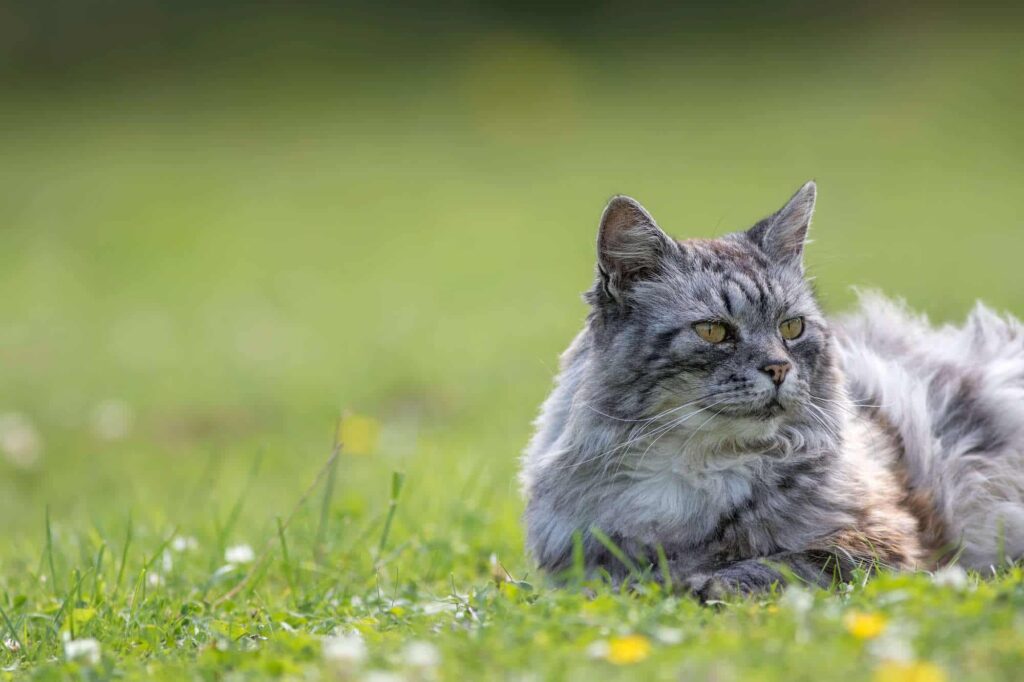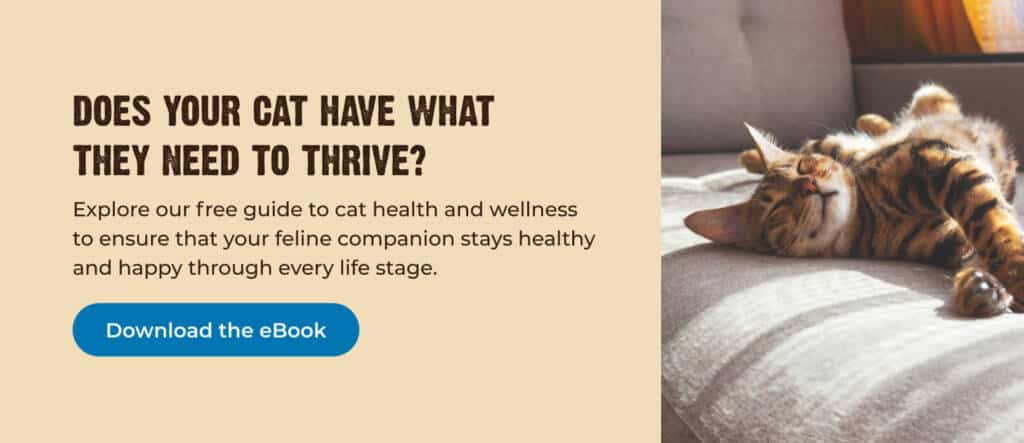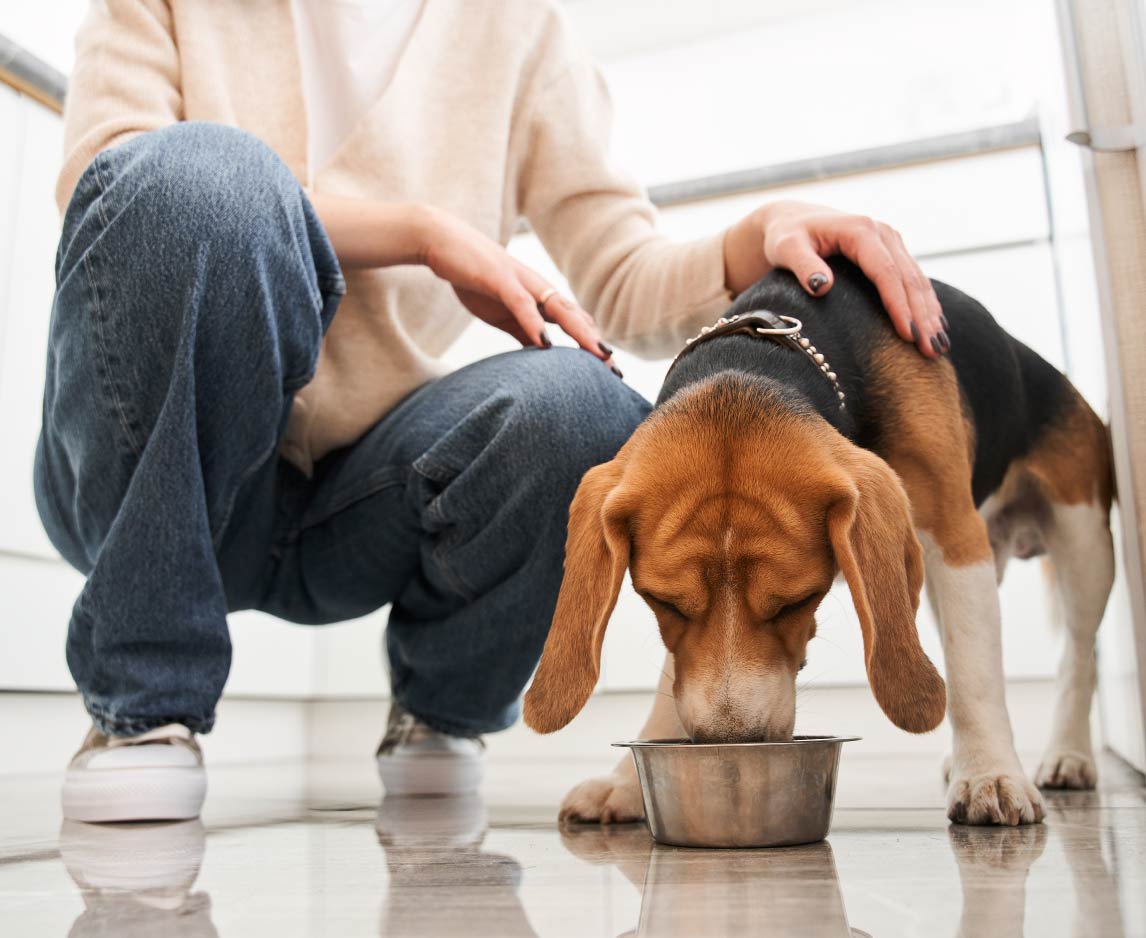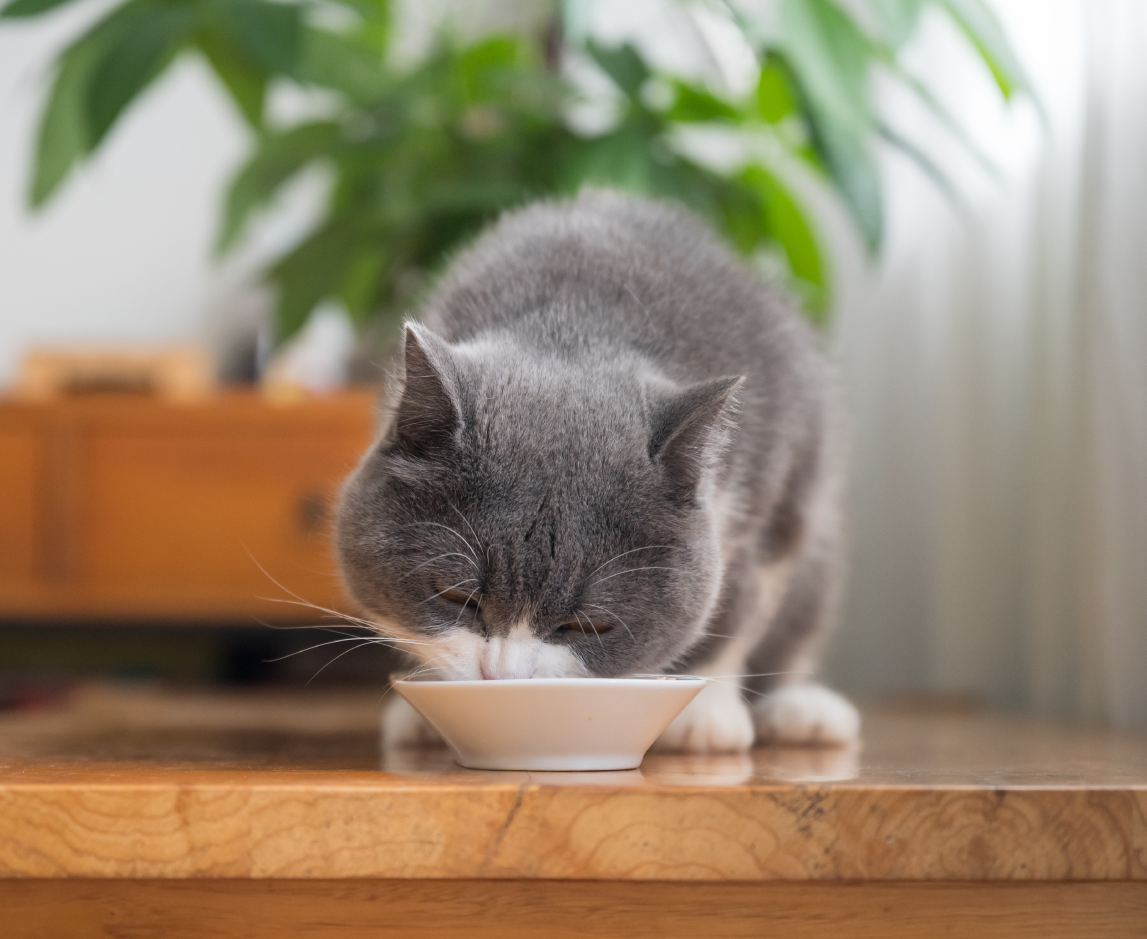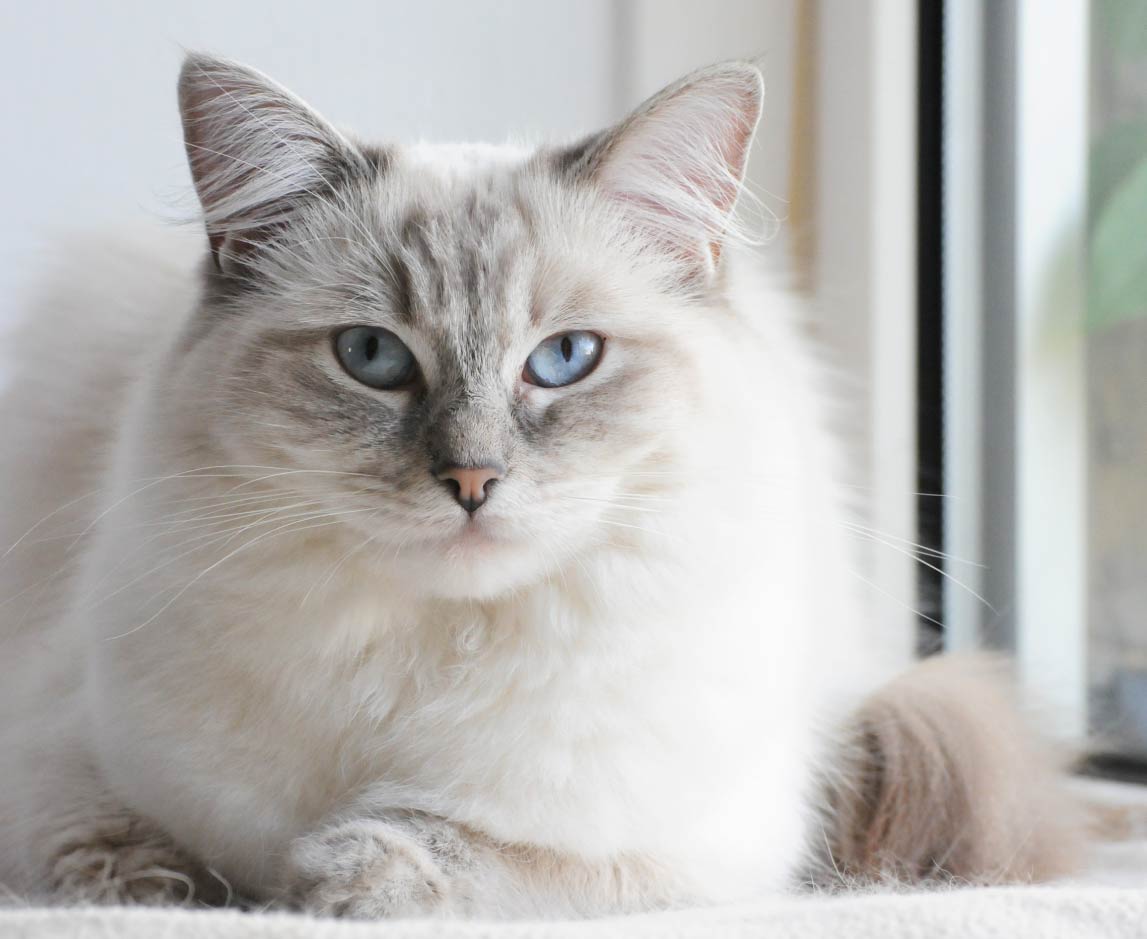Having a cat can mean a lot of things. For one, a cat can be a true family member who is loved and cherished for many years. The average housecat’s lifespan is about 15 years, though it is not unusual for domestic cats to reach their late teens or even twenties. As such, cat parents often wonder about their feline’s changing nutritional needs and especially what to feed a senior cat. Let’s dig deeper into this common question.
What Dietary Changes Do Older Cats Need?
The American Association of Feline Practitioners (AAFP) considers cats older than 11 to be senior and cats 15 or older geriatric. Based on averages, most cats will qualify as seniors for at least four years, or more than 25% of their lifespan.
Cats’ energy expenditure slows as they age, which means that they do not burn as many calories in their later years. Slowing metabolisms can cause weight gain, which can lead to a number of serious health issues like diabetes. Along with monitoring (and even reducing) your older cat’s food consumption, make sure they always have access to clean water. Proper hydration aids in smooth digestion and organ function and helps prevent urinary tract issues.
For cats of any age, it’s important to meet the nutritional requirements for their particular life stage. The American Association of Feed Control Officials (AAFCO) is responsible for setting labeling standards and nutritional requirements for pet food. The AAFCO recognizes two life stages for cats and dogs: Adult Maintenance and Growth and Reproduction (an All Life Stages label denotes foods that meet the requirements for both stages). Each category stipulates the minimum biological requirements for macronutrients, vitamins and minerals.
Kittens and young cats are generally considered to be in the Growth stage during their first year of life and Reproduction while pregnant or lactating. Senior cats fall into the Adult Maintenance category. How they eat in their younger years will have a significant effect on their health in their twilight years; minimally processed, high-protein diets free of excessive carbohydrates lay a great foundation for lifelong well-being.
Is Senior Cat Food Necessary?
First things first: there is no such thing as “senior cat food.”
“On pet food labels, the word ‘senior’ is a marketing term, not a regulatory or clinical designation,” says Dr. Lee Pickett, VMD, writing for her weekly “Ask the Vet” newspaper column. “Veterinarians often say, ‘Age is not a disease,’ so there's no reason healthy senior cats need special food just because they're old.” Dr. Pickett clarifies that the AAFCO has not established a nutrient profile specifically for senior cats, since they often have the same nutritional needs as younger adult cats.
Dr. Joseph Bartges, DVM, of the University of Georgia College of Veterinary Medicine, agrees. “Whether a cat needs these dietary modifications is really cat dependent.”
Whatever their unique needs, when it comes to feeding your cat so-called senior cat food, think in terms of optimizing their quality of life. If you’re looking to adjust your senior cat’s diet, four main factors should be taken into account: hydration, added nutrients, ease of consumption and addressing issues through solution-based diets.
Hydration: As cats age, they tend to consume less water — even less than they do naturally as obligate carnivores. As such, mature felines can benefit a great deal from moisture-rich foods. Proper hydration supports overall kidney health and helps to prevent kidney stones, which become more of a concern in older cats, especially males. (See below for more on the importance of moisture for senior cats.)
Added nutrients: While always important, making sure your cat’s diet meets their nutritional requirements becomes particularly important as they age. Specifically, you can help keep issues concerning bone health at bay with added calcium and phosphorus, while added vitamin A can support immune system function.
Ease of consumption: Cats’ teeth weaken as they age, often due to undetected dental issues such as gingivitis and periodontitis from plaque buildup. To prevent tooth loosening, chipping or discomfort, prioritize feeding them soft, wet foods over hard, dry foods.
Solution-based diet: As older cats become more susceptible to disease and other health concerns — particularly kidney disease and urinary or gastrointestinal tract infections — your vet may suggest prevention or treatment through diet. Foods formulated to address certain health issues are referred to as “solution-based” and should really only be fed following a veterinarian’s recommendation.
How to Choose the Best Food for Your Senior Cat
On pet food labels, the AAFCO’s Nutritional Adequacy Statement confirms that the food is approved for a particular life stage. Look for any of the following versions of this statement near the Guaranteed Analysis section when choosing food for your senior cat:
![A yellow piece of paper with a background pattern of fish and pawprints has a torn bottom edge. The paper scrap reads: [Product name] is formulated to meet the nutritional levels established by the AAFCO Cat Food Nutrient Profiles for maintenance of adult cats.](https://rawznaturalpetfood.com/wp-content/uploads/2022/02/Cat-food-for-senior-cats.png)
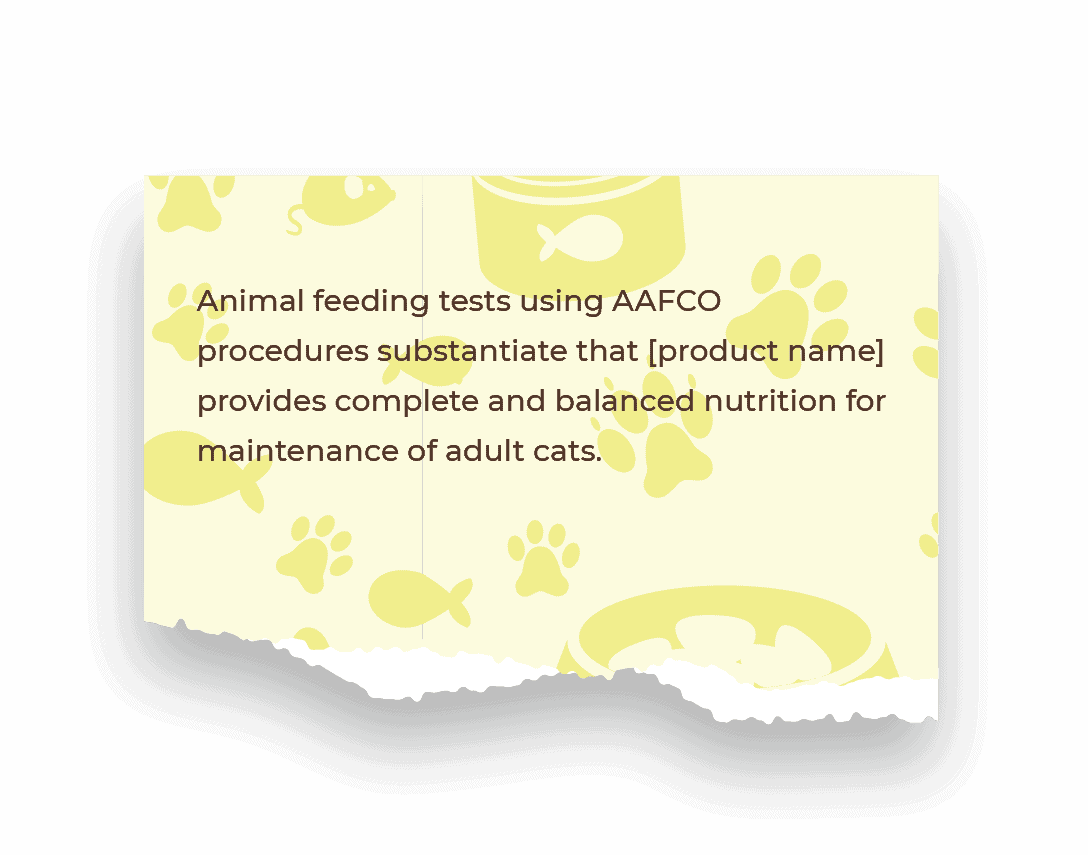
![A yellow piece of paper with a background pattern of fish and pawprints has a torn bottom edge. The paper scrap reads: [Product name] provides complete and balanced nutrition for maintenance of adult cats and is comparable to a product that has been substantiated using AAFCO feeding tests.](https://rawznaturalpetfood.com/wp-content/uploads/2022/02/Best-cat-food-for-senior-cats-.png)
>Related Reading: What's In Their Bowl? How to Read & Decode a Pet Food Label
In terms of specific ingredients or qualities, consider the following important factors when choosing the best senior cat food:
Calories: As cats reach “middle age” (between 7–10 years), their activity levels decline, as does their required caloric intake. At around 11 years of age, a cat’s caloric needs actually start to increase again, but it can become more difficult for them to keep weight on. This is because older cats have a harder time digesting macronutrients like protein and fats (more on this below) and instead pass them as waste. Senior cats need high-protein foods with easily digestible ingredients in order to meet their daily caloric requirements. Try to notice if your older cat is losing weight or if their energy is significantly reduced, and consult your veterinarian about any energy- or weight-related concerns.
Moisture: As we mentioned above, proper hydration is vital for all cats, as it helps to maintain proper organ function and overall health. Vital organs, particularly the kidneys, can start to deteriorate as cats age, so proper hydration becomes essential. Introduce them to wet foods that have a higher moisture content to help your cat make up for their decreased thirst drive.
Protein: Since new tissue growth slows with age, it stands to reason that older cats would need less protein. However, since research into cat health is helping domestic felines live longer, protein becomes even more important for maintaining optimal body condition (especially muscle mass). Nutrient absorption does decline overall, though, so the digestibility and quality of the protein is a key concern. Seek out minimally processed food for senior cats with a high protein efficiency ratio (PER).
Digestibility: Ingredients are important, but the physical qualities of the food can have an equally significant impact on a senior cat. Put simply, digestibility is the measure of how much nutrition is absorbed by a cat’s digestive system, rather than passed as waste. As a benchmark, a food with 80% digestibility is considered average, while anything below 75% is considered poor. Anything above 80% is considered to have “premium” digestibility, since 20% or less of what’s in the bag will be passed as waste. At nearly 88% digestibility, RAWZ can be a wonderful option for senior cat food.
Lastly, take care to feed your cat appropriate portion sizes.
“Be sure to ask your veterinarian for a specific portion recommendation, and divide the daily total into 2–5 meals depending upon your schedule,” write Dr. Krista Williams and Dr. Robin Downing of VCA Animal Hospitals. “Do not rely on the feeding chart on the bag of kibble as it will overestimate how much you should feed. You want a portion recommendation tailored to your cat.”
Once you determine the appropriate quantity to feed your cat at each meal, Drs. Williams and Downing recommend you use regular weigh-ins at your veterinarian's office (or a baby scale at home) to track any weight gain or loss.
How to Feed a Senior Cat with a Health Condition
While cats can develop a wide array of health conditions as they age, two of the most common diseases in senior cats are diabetes and kidney disease.
As with humans, feline diabetes is related to how the body regulates blood sugar (glucose) levels. Glucose provides energy for muscles and tissue and is the brain’s main fuel source — but if glucose levels are thrown out of normal range due to diabetes, excessively high or low levels can cause weight loss, increased thirst and/or urination, lethargy, dehydration and changes in appetite. In order to prevent diabetes or mitigate its symptoms, senior cats should consume low-carb foods with a low glycemic index and get regular exercise.
Chronic kidney disease (CKD) is also a serious concern in older cats. A part of the renal system, the kidneys are responsible for filtering toxins out of the blood and making urine. Kidney disease results when this system starts to fail and causes symptoms such as frequent urination, weight loss, excessive thirst, dry skin, vomiting, diarrhea and bloody or cloudy urine. To prevent CKD, it’s important that cats stay hydrated, possibly by the inclusion of moisture-rich food, especially as they age.
If you suspect your older cat may have or be at risk of developing diabetes or CKDTo prevent CKD, it’s important that cats stay hydrated and eat plenty of moisture-rich food, e, consult your veterinarian to receive an accurate diagnosis and treatment plan.
>Related Reading: 24 Common Cat Diseases & Health Problems [Plus Symptom Guide]
How to Prevent Obesity in Senior Cats
An estimated 60% of domestic cats in the U.S. are considered obese, which can lead to a host of health issues. Cat parents need to monitor their feline’s weight as they age, particularly as activity and exercise levels may decline in older cats.
>Related Reading: How Much Should Cats Weigh? How to Keep Your Cat Healthy and Happy
To prevent weight gain in older cats, it all comes down to energy input and output. Senior cats may be less active as they age and therefore don’t expend all the calories they consume, which can lead to weight gain. Along with feeding them a low-carb, high protein diet, playtime is a great way to encourage your cat to exercise and stay active well past their kittenhood.
Can You Give a Senior Cat Supplements?
Just like humans, cats sometimes need an extra boost of vitamins and minerals in the form of supplements. If your senior cat experiences healthy and normal digestion on a complete, balanced diet formulated for cats in the Adult Maintenance life stage, supplements should not be necessary. However, nutrient absorption levels will vary between individual felines depending on their age and the presence of medical conditions, and supplements can help them maintain proper nutrition.
Your cat’s veterinarian can help identify possible nutritional deficiencies and recommend the right supplements, as well as uncover any additional underlying cause(s). Never give your cats supplements formulated for humans, as high levels of certain nutrients can be toxic to cats.
Can Senior Cats Have Treats?
Treats are specially formulated foods, often bite-sized, that typically are not nutritionally complete or balanced. They are intended for intermittent reward-based feeding only. For cats of any age, treats should only contribute a maximum of 10% of their total daily caloric intake, so remember to count treat calories accordingly. This is especially important for older felines who may be slowing down and expending less energy.
It’s a good idea to give senior cats treats that contain a nutrient or nutrients they may be lacking in their diet. Consider it supplementation through treating: Dehydration is often an issue for aging felines, so treats with high moisture content can be quite beneficial.
Can I Feed My Senior Cat Human Food?
While you may think it seems generous, feeding our cats from our own plates can be risky, since some human foods are toxic to our feline family members. Here are a few examples of foods to avoid feeding your cat entirely, along with some that get the green light in moderation:
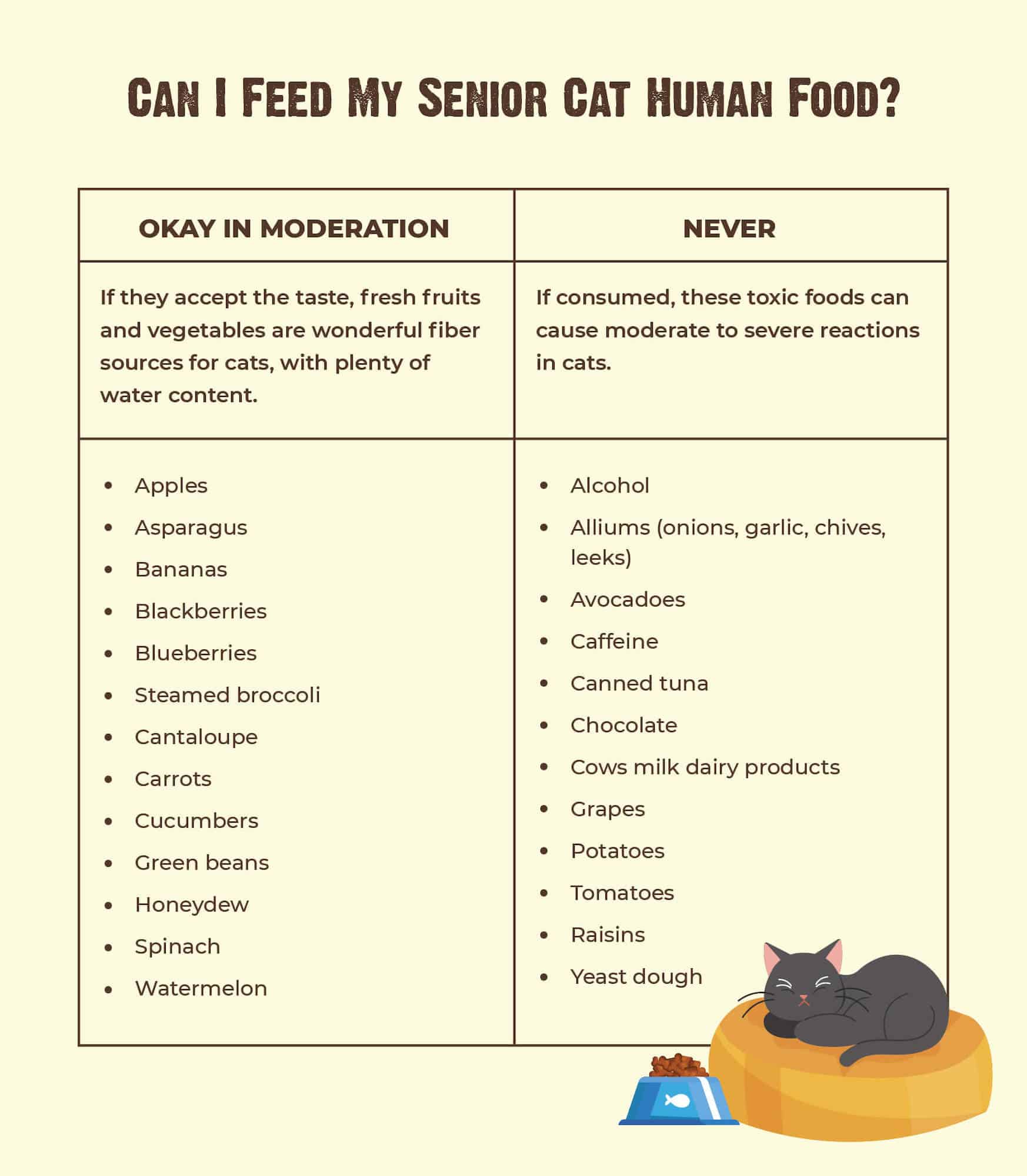
Tips For Transitioning Your Feline To Senior Cat Food
Your beloved feline companion is getting up there in years, so you’ve decided to transition them to so-called senior cat food. How exactly do you begin?
House cats follow fairly regimented eating patterns, preferring to eat the same food at the same time in the same place every day. Just like humans, the older cats get, the more they benefit from predictability in their routine. Changes to their mealtime ritual can lead to digestion issues or even a refusal to eat.
“Cats are creatures of habit, and if they have been eating dry food all of their lives, they may not accept a change to a canned food,” says Dr. Bartges of the University of Georgia. “One way to avoid this is to provide variety starting at a young age — not only with dry and canned but different flavors and different companies.”
No matter their age, any transitions to new foods should be gradual to give your cat the best chance of adjusting.
At RAWZ, we find that the best method for transitioning is to gradually mix the new food into your cat’s existing food over a 5–7 day period, increasing the new portion by 20% each day. By day 5 or 7, you should be feeding 100% new food. Since wet food is nearly 80% moisture and extremely digestible, a transition between different wet foods (as opposed to dry foods) seems to be easier for older cats to make. Take it slow regardless, to minimize gastrointestinal distress.
Another important thing to keep in mind when transitioning a cat to a new diet is the source of the protein. Cats may reject an unfamiliar protein on taste alone; a new protein could also reveal a previously unknown allergy. This is another reason to take the transition as slowly as you can, and stop feeding the new food immediately if you notice any adverse reactions.
What If My Senior Cat Won't Eat?
While most cat owners can likely identify with having a finicky feline, a cat who voluntarily won’t eat at all can understandably cause concern.
Kittens who stop eating for more than twelve hours should see a vet right away; adult cats should see a vet after twenty-four hours without eating. While it’s not uncommon for cats to experience fluctuations in appetite, if there is a true refusal to eat and/or accompanied by vomiting, diarrhea, lethargy or trouble breathing, the cat should receive medical attention immediately.
If your senior cat seems to have lost their appetite but does not display any symptoms, try to pique your cat’s mealtime interests with variety. Rotating flavors, textures and even food temperature in their bowl can help stimulate a cat’s appetite. Remember: Because a lack of appetite can indicate a multitude of underlying health conditions, it’s always a safe bet to consult a veterinarian for advice.
FAQs: Choosing the Right Food for Your Senior Cat
Q: Can I feed my senior cat dry food?
Dental health challenges such as gingivitis and tooth decay can make chewing food, particularly dry food, difficult for older cats. If your cat’s teeth are challenged by harder kibble, prioritize softer, moisture-rich wet foods instead.
Q: How do I get my senior cat to drink more water?
Water is essential to a cat's health at any life stage, but it’s particularly important for senior cats. Organs can’t operate as efficiently without adequate hydration, and aging cats’ organs need all the help they can get. Plus, cats have evolved to have a naturally low thirst drive and sometimes need to be reminded to drink water. Ensure your senior cat always has access to clean, fresh water from a bowl or cat fountain . If plain water doesn’t tempt them, your senior cat may require more moisture-rich food or treats in their diet. Foods and toppers with high water content are a delicious way to keep your cat hydrated and happy!
Q. When should I switch my cat to senior cat food?
Historically, cats were considered seniors at around 7 years of age. However, with more informed nutrition and healthcare, domestic cats are seeing longer life expectancies than ever before. Nowadays, general consensus is that 7–10 years old represents middle age, with cats reaching peak senior status at around 14 years. Cats aged 15–25 years are considered geriatric. With careful observation and vet consultation, you can transition your cat to senior-friendly food anytime between 10 and 14 years of age; certain age-related health issues may also indicate the time to transition.
Q. What is the difference between regular cat food and senior cat food?
In terms of ingredients, foods with a “senior cat food” label do not differ significantly from cat food labeled “Adult Maintenance” by the AAFCO. There have been studies conducted that found trace differences between “adult” and “senior” cat foods, namely that senior cat foods contain slightly higher fiber and caloric content than “Adult Maintenance” recipes.
If anything, the differences are most apparent in texture and moisture content, but foods labeled “minimally processed” that contain straightforward ingredients and essential nutrients are best for cats at all stages of adulthood.
To explore more tasty options for senior cats, peruse RAWZ Meal-Free Dry Foods, Gum-Free Wet Foods and All-Natural Savory Toppers.


